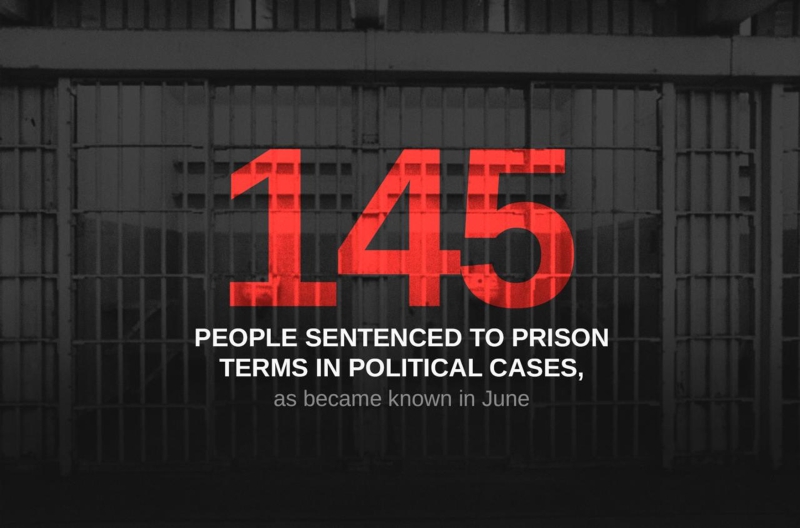Contents
In June, 110 verdicts were announced by Russian and Russia-installed courts in occupied Ukraine, with 145 individuals sentenced to prison terms in politically motivated cases. The Insider, in collaboration with an independent data analytics center led by Kirill Parubets, continues to compile a chronicle of repression and publish the names of everyone deprived of their freedom by Russia for political reasons or for actions connected to its ongoing invasion of Ukraine.
Among the 145 sentenced to prison:
- 60 Ukrainian POWs were tried under “terrorism” charges, a typical tactic of Russian prosecutors; 49 of them had been captured in Russia’s western Kursk Region, which borders Ukraine, and were effectively convicted of illegally crossing the border.
- 57 individuals were convicted under charges including terrorism, sabotage, treason, and espionage.
- 28 people received prison terms for social media posts, for “desecrating symbols of military glory,” for their associations with “undesirable” or “extremist” organizations, or for participation in protests.
Aside from the verdicts passed in June, the report includes earlier rulings that became public only recently or were not covered in the May roundup.
“Treason,” “terrorism,” “sabotage,” and “espionage”
- May 23
Archaeologist and geophysicist Andrei Veryanov, who worked for over 20 years in Peru, was sentenced to 24 years in prison for treason and involvement in a terrorist organization. The Moscow City Court issued the verdict on May 23, though it became public only in June. According to the FSB, Veryanov used drones in order to create false targets near Defense Ministry sites. BBC News Russian suggests he was suspected of having ties with the “Freedom of Russia” legion. In a letter from pretrial detention, Veryanov wrote that he had resisted the war from the beginning and took part in protests.
Specifically, Article 356 of the Russian Criminal Code: “Use of Prohibited Means and Methods of Warfare.”
Falun Gong is a spiritual and physical practice founded by Li Hongzhi in China in the early 1990s. Its followers combine meditative exercises with a pursuit of moral and spiritual purification. According to the Falun Dafa Information Center, adherents of the movement face widespread persecution in China, often with lethal consequences. In Russia, seven organizations linked to Falun Gong were declared «undesirable» in the summer of 2020.
The ribbon of Saint George is a Russian military symbol consisting of a black and orange bicolour pattern, with three black and two orange stripes.
Originally created as part of the Russian imperial Order of St. George in 1769, the orange-and-black ribbon was resurrected by the Soviet Union for a medal to celebrate victory over Nazi Germany in World War II. The ribbon’s colors became a fixture of annual May 9 Victory Day celebrations in the Soviet Union and later in Russia, when they began being handed out en masse in 2005. Nearly a decade later, pro-Kremlin activists adopted the ribbon as a symbol during Russia’s 2014 annexation of Crimea and its involvement in the war in Donbas in eastern Ukraine. It has since become widely associated with Russian military aggression.
Ukraine, Moldova, Latvia, Lithuania, and Estonia have all banned the ribbon of St. George from display on their territory after the start of the full-scale invasion of Ukraine in February 2022.
The Eternal Flame is a monument with a continuously burning flame, symbolizing the eternal remembrance of those who died in war, particularly World War II (referred to in Russian historiography as the «Great Patriotic War» when describing the Eastern Front) in the Soviet and post-Soviet tradition.

- May 26
Fifty-seven-year-old traveler Igor Kursakov, from Kaliningrad, received 14 years after being convicted of treason by the Baltic Fleet Military Court. The FSB accused Kursakov of passing information to Ukrainian intelligence. He will serve 19 years in total due to a prior conviction for allegedly preparing a terrorist attack at a military base on orders from Ukraine’s Azov Brigade and for storing explosives. Court documents cited Kursakov’s “pacifist worldview” and desire to leave Russia after the full-scale invasion began.
- May 29
Andrei Glukhov, a 21-year-old student from Volgograd with cerebral palsy, was sentenced to 12 years in a high-security prison for treason by the Volgograd Regional Court. The case centered on two transfers of 1,500 rubles each (around $20) to a Ukrainian account after chatting with an acquaintance online. His father said Glukhov rarely left the house due to his disability and limited mobility.
Specifically, Article 356 of the Russian Criminal Code: “Use of Prohibited Means and Methods of Warfare.”
Falun Gong is a spiritual and physical practice founded by Li Hongzhi in China in the early 1990s. Its followers combine meditative exercises with a pursuit of moral and spiritual purification. According to the Falun Dafa Information Center, adherents of the movement face widespread persecution in China, often with lethal consequences. In Russia, seven organizations linked to Falun Gong were declared «undesirable» in the summer of 2020.
The ribbon of Saint George is a Russian military symbol consisting of a black and orange bicolour pattern, with three black and two orange stripes.
Originally created as part of the Russian imperial Order of St. George in 1769, the orange-and-black ribbon was resurrected by the Soviet Union for a medal to celebrate victory over Nazi Germany in World War II. The ribbon’s colors became a fixture of annual May 9 Victory Day celebrations in the Soviet Union and later in Russia, when they began being handed out en masse in 2005. Nearly a decade later, pro-Kremlin activists adopted the ribbon as a symbol during Russia’s 2014 annexation of Crimea and its involvement in the war in Donbas in eastern Ukraine. It has since become widely associated with Russian military aggression.
Ukraine, Moldova, Latvia, Lithuania, and Estonia have all banned the ribbon of St. George from display on their territory after the start of the full-scale invasion of Ukraine in February 2022.
The Eternal Flame is a monument with a continuously burning flame, symbolizing the eternal remembrance of those who died in war, particularly World War II (referred to in Russian historiography as the «Great Patriotic War» when describing the Eastern Front) in the Soviet and post-Soviet tradition.

Alexei Tushov, 51, and his wife Elena Sen’, 49, from Mikhaylovsk in the Stavropol Region, were sentenced to 16 and 13 years respectively for treason and preparing a terrorist attack. According to the Southern District Military Court in Rostov-on-Don, Tushov contacted Ukrainian intelligence, received a homemade bomb, and planned to blow up fuel tankers with his wife’s participation.
- May 30
A 17-year-old from Dagestan was sentenced to 8 years in a juvenile correctional colony for sabotage after being accused of setting fire to a Su-34 fighter jet at Shagol air base in Chelyabinsk, a video of which was shared by HUR, Ukraine’s military intelligence agency. The Chelyabinsk Regional Court ruled that the minor had received 4.5 million rubles (just over $57,500) and travel funds from an unknown individual acting on behalf of Ukrainian intelligence. The aircraft was not destroyed, but damages were estimated at 62 million rubles (just over $794,000). He partially admitted guilt but did not explain his position in court. Authorities froze his family’s assets.
Specifically, Article 356 of the Russian Criminal Code: “Use of Prohibited Means and Methods of Warfare.”
Falun Gong is a spiritual and physical practice founded by Li Hongzhi in China in the early 1990s. Its followers combine meditative exercises with a pursuit of moral and spiritual purification. According to the Falun Dafa Information Center, adherents of the movement face widespread persecution in China, often with lethal consequences. In Russia, seven organizations linked to Falun Gong were declared «undesirable» in the summer of 2020.
The ribbon of Saint George is a Russian military symbol consisting of a black and orange bicolour pattern, with three black and two orange stripes.
Originally created as part of the Russian imperial Order of St. George in 1769, the orange-and-black ribbon was resurrected by the Soviet Union for a medal to celebrate victory over Nazi Germany in World War II. The ribbon’s colors became a fixture of annual May 9 Victory Day celebrations in the Soviet Union and later in Russia, when they began being handed out en masse in 2005. Nearly a decade later, pro-Kremlin activists adopted the ribbon as a symbol during Russia’s 2014 annexation of Crimea and its involvement in the war in Donbas in eastern Ukraine. It has since become widely associated with Russian military aggression.
Ukraine, Moldova, Latvia, Lithuania, and Estonia have all banned the ribbon of St. George from display on their territory after the start of the full-scale invasion of Ukraine in February 2022.
The Eternal Flame is a monument with a continuously burning flame, symbolizing the eternal remembrance of those who died in war, particularly World War II (referred to in Russian historiography as the «Great Patriotic War» when describing the Eastern Front) in the Soviet and post-Soviet tradition.
Igor Nuzhdov, 58, from Penza, was sentenced to 13 years for attempted treason by the Penza Regional Court. The FSB claimed that in 2023 he passed information about a defense contractor to the Ukrainian military. When Nuzhdov was arrested in early 2024, he was registered as a self-employed hairdresser.
- June 2
The Southern District Military Court sentenced 30-year-old Artyom Murdid to life in prison for international terrorism. His mother, Anna Murdid, 52, received 22 years. His partner, Anna Voshkoder, 27, got 20. The court found them guilty of involvement in a terrorist group, making explosives, and attempting to kill Russian-appointed officials in occupied Melitopol. According to the court, in 2022-2023 Murdid acted on SBU orders to plant bombs near the homes and vehicles of collaborators and also on railway infrastructure. One bombing killed a municipal official; another injured the state railway station chief. A third was foiled.
Specifically, Article 356 of the Russian Criminal Code: “Use of Prohibited Means and Methods of Warfare.”
Falun Gong is a spiritual and physical practice founded by Li Hongzhi in China in the early 1990s. Its followers combine meditative exercises with a pursuit of moral and spiritual purification. According to the Falun Dafa Information Center, adherents of the movement face widespread persecution in China, often with lethal consequences. In Russia, seven organizations linked to Falun Gong were declared «undesirable» in the summer of 2020.
The ribbon of Saint George is a Russian military symbol consisting of a black and orange bicolour pattern, with three black and two orange stripes.
Originally created as part of the Russian imperial Order of St. George in 1769, the orange-and-black ribbon was resurrected by the Soviet Union for a medal to celebrate victory over Nazi Germany in World War II. The ribbon’s colors became a fixture of annual May 9 Victory Day celebrations in the Soviet Union and later in Russia, when they began being handed out en masse in 2005. Nearly a decade later, pro-Kremlin activists adopted the ribbon as a symbol during Russia’s 2014 annexation of Crimea and its involvement in the war in Donbas in eastern Ukraine. It has since become widely associated with Russian military aggression.
Ukraine, Moldova, Latvia, Lithuania, and Estonia have all banned the ribbon of St. George from display on their territory after the start of the full-scale invasion of Ukraine in February 2022.
The Eternal Flame is a monument with a continuously burning flame, symbolizing the eternal remembrance of those who died in war, particularly World War II (referred to in Russian historiography as the «Great Patriotic War» when describing the Eastern Front) in the Soviet and post-Soviet tradition.
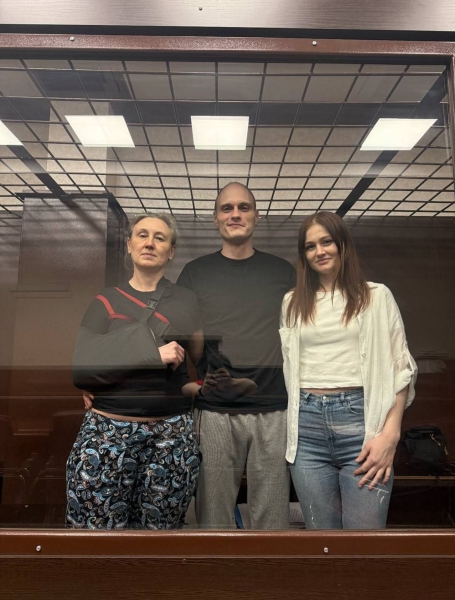
- June 3
Vadym Trachuk, from the southern Ukrainian town of Enerhodar, was sentenced to 25 years for participating in a terrorist group and attempting to kill collaborators in occupied Zaporizhzhia. According to the Southern District Military Court, he targeted a local administrator by placing a homemade bomb in an apartment stairwell, injuring three people. In 2023, Trachuk prepared another bomb for the deputy director of the Zaporizhzhia Nuclear Plant — but it was defused before detonation.
Ukrainian refugee Valentyna Tahyrova was sentenced to 8 years for allegedly planning a terrorist attack. Investigators claim she photographed buildings in Samara and bought household chemicals on the instructions of an unidentified man posing as a representative of a Ukrainian security service. Her defense says she was manipulated by an undercover FSB agent, who is also a witness for the prosecution.
- June 4
The occupying Supreme Court of Crimea issued a closed verdict for treason. The defendant’s name, along with the case details, remain unknown.
A 56-year-old from the Rostov Region received 12 years for treason. The court claims that in 2022 he transferred money to a Ukrainian account in order to support the Armed Forces of Ukraine.
Nadiia Pliekhova (Nadezhda Plekhova), 42, from the Kherson Region, was sentenced to 13 years for treason and espionage by the Russia-installed Kherson Regional Court. The court said she passed the coordinates of Russian troop locations stationed in the Henichesk District to Ukraine and continued doing so after gaining Russian citizenship in 2023.
Specifically, Article 356 of the Russian Criminal Code: “Use of Prohibited Means and Methods of Warfare.”
Falun Gong is a spiritual and physical practice founded by Li Hongzhi in China in the early 1990s. Its followers combine meditative exercises with a pursuit of moral and spiritual purification. According to the Falun Dafa Information Center, adherents of the movement face widespread persecution in China, often with lethal consequences. In Russia, seven organizations linked to Falun Gong were declared «undesirable» in the summer of 2020.
The ribbon of Saint George is a Russian military symbol consisting of a black and orange bicolour pattern, with three black and two orange stripes.
Originally created as part of the Russian imperial Order of St. George in 1769, the orange-and-black ribbon was resurrected by the Soviet Union for a medal to celebrate victory over Nazi Germany in World War II. The ribbon’s colors became a fixture of annual May 9 Victory Day celebrations in the Soviet Union and later in Russia, when they began being handed out en masse in 2005. Nearly a decade later, pro-Kremlin activists adopted the ribbon as a symbol during Russia’s 2014 annexation of Crimea and its involvement in the war in Donbas in eastern Ukraine. It has since become widely associated with Russian military aggression.
Ukraine, Moldova, Latvia, Lithuania, and Estonia have all banned the ribbon of St. George from display on their territory after the start of the full-scale invasion of Ukraine in February 2022.
The Eternal Flame is a monument with a continuously burning flame, symbolizing the eternal remembrance of those who died in war, particularly World War II (referred to in Russian historiography as the «Great Patriotic War» when describing the Eastern Front) in the Soviet and post-Soviet tradition.
- June 5
Valeria Marchenko, from the Sverdlovsk Region, received 20 years for treason, terrorist training, and planning to set fire to a military enlistment office. The Central District Military Court claimed she accessed classified information and communicated with the Ukrainian military. She worked at a poultry farm and raised two children alone. In a letter from jail, she wrote:
“Because it's time to stop being silent and afraid, watching countless people die and darkness run rampant!”
Specifically, Article 356 of the Russian Criminal Code: “Use of Prohibited Means and Methods of Warfare.”
Falun Gong is a spiritual and physical practice founded by Li Hongzhi in China in the early 1990s. Its followers combine meditative exercises with a pursuit of moral and spiritual purification. According to the Falun Dafa Information Center, adherents of the movement face widespread persecution in China, often with lethal consequences. In Russia, seven organizations linked to Falun Gong were declared «undesirable» in the summer of 2020.
The ribbon of Saint George is a Russian military symbol consisting of a black and orange bicolour pattern, with three black and two orange stripes.
Originally created as part of the Russian imperial Order of St. George in 1769, the orange-and-black ribbon was resurrected by the Soviet Union for a medal to celebrate victory over Nazi Germany in World War II. The ribbon’s colors became a fixture of annual May 9 Victory Day celebrations in the Soviet Union and later in Russia, when they began being handed out en masse in 2005. Nearly a decade later, pro-Kremlin activists adopted the ribbon as a symbol during Russia’s 2014 annexation of Crimea and its involvement in the war in Donbas in eastern Ukraine. It has since become widely associated with Russian military aggression.
Ukraine, Moldova, Latvia, Lithuania, and Estonia have all banned the ribbon of St. George from display on their territory after the start of the full-scale invasion of Ukraine in February 2022.
The Eternal Flame is a monument with a continuously burning flame, symbolizing the eternal remembrance of those who died in war, particularly World War II (referred to in Russian historiography as the «Great Patriotic War» when describing the Eastern Front) in the Soviet and post-Soviet tradition.

In Crimea, former police officer Lyudmila Kolesnikova was sentenced to 17 years for treason. The occupying Supreme Court found that she had supported Ukraine’s armed forces. She had left Yalta for Ireland after the war began but was arrested in 2024 when she returned for her mother’s funeral. The case allegedly centered on two NFT stamps called “Warship.”
- June 6
Ilkin Melikov was sentenced to 13 years by the Central District Military Court in Yekaterinburg for participating in the so-called “Nizhnevartovsk Jamaat” terrorist group. Defendants reported having been tortured and pressured by the authorities. Melikov was abducted in Georgia in 2022, where he was seeking asylum, and ended up behind bars at a pretrial detention facility in Russia.
The Khabarovsk Regional Court sentenced Viktor Nikitin under a law on “secret cooperation with a foreign state.” The case details remain unknown.
A 42-year-old from the Omsk Region in Siberia was handed 12 years for treason. He was accused of passing military-industrial information to Ukraine from November 2023 to March 2024. His identity remains undisclosed.
The occupying “Supreme Court” of the “Luhansk People’s Republic” sentenced an unnamed minor at the time of arrest (last name starting with the letter “Щ,” pronounced “Shch.”) to 8 years for espionage. The court said began opposing Russia’s invasion after viewing foreign content that criticized the Russian military, and that he shared intelligence with Ukraine.
- June 9
The Tyumen Regional Court sentenced students Daniil Korkin and Maksim Yurchuk to 9 and 8 years respectively for railway sabotage. As minors, they were accused of setting fire to relay boxes and a locomotive on the Sverdlovsk Railway, and of planning another arson. The court said they were acting on instructions obtained via the messaging app Telegram. Their cryptocurrency reward was allegedly laundered. Damages exceeded 2.3 million rubles (close to $29,500).
- June 10
Alexander Filiptev, 25, from Moscow, was sentenced to 15 years for participating in a terrorist organization and planning terrorist attacks. The court claimed he sent coordinates of Russian troops in Luhansk and railway routes in Sochi to Ukrainian agents.
Larysa Havrylenko, 63, from the Zaporizhzhia Region, was sentenced to 16 years for planning an attack on a military truck, for her affiliation with a terrorist group, and for treason. The court said she placed an improvides explosive device (IED) under a Russian Defense Ministry truck in October 2023 (defused before detonation) and that she had two other IEDs at home. Havrylenko allegedly acted on orders from the Security Service of Ukraine (SBU).
The 1st Western District Military Court sentenced former St. Petersburg policeman Konstantin Podoshvelev to 14 years for involvement in a terrorist organization and for anti-war graffiti. Prosecutors claim he contacted the “Freedom of Russia” legion and that he painted slogans such as “ROC [RUSSIAN ORTHODOX CHURCH] FOR MURDERERS” («РПЦ ZА УБИЙЦ») on two churches in the city and “POLYTECH FOR MURDERERS” («ПОЛИТЕХ ZА УБИЙЦ») at his former university. He denied guilt and reported being tortured after his arrest.
Specifically, Article 356 of the Russian Criminal Code: “Use of Prohibited Means and Methods of Warfare.”
Falun Gong is a spiritual and physical practice founded by Li Hongzhi in China in the early 1990s. Its followers combine meditative exercises with a pursuit of moral and spiritual purification. According to the Falun Dafa Information Center, adherents of the movement face widespread persecution in China, often with lethal consequences. In Russia, seven organizations linked to Falun Gong were declared «undesirable» in the summer of 2020.
The ribbon of Saint George is a Russian military symbol consisting of a black and orange bicolour pattern, with three black and two orange stripes.
Originally created as part of the Russian imperial Order of St. George in 1769, the orange-and-black ribbon was resurrected by the Soviet Union for a medal to celebrate victory over Nazi Germany in World War II. The ribbon’s colors became a fixture of annual May 9 Victory Day celebrations in the Soviet Union and later in Russia, when they began being handed out en masse in 2005. Nearly a decade later, pro-Kremlin activists adopted the ribbon as a symbol during Russia’s 2014 annexation of Crimea and its involvement in the war in Donbas in eastern Ukraine. It has since become widely associated with Russian military aggression.
Ukraine, Moldova, Latvia, Lithuania, and Estonia have all banned the ribbon of St. George from display on their territory after the start of the full-scale invasion of Ukraine in February 2022.
The Eternal Flame is a monument with a continuously burning flame, symbolizing the eternal remembrance of those who died in war, particularly World War II (referred to in Russian historiography as the «Great Patriotic War» when describing the Eastern Front) in the Soviet and post-Soviet tradition.
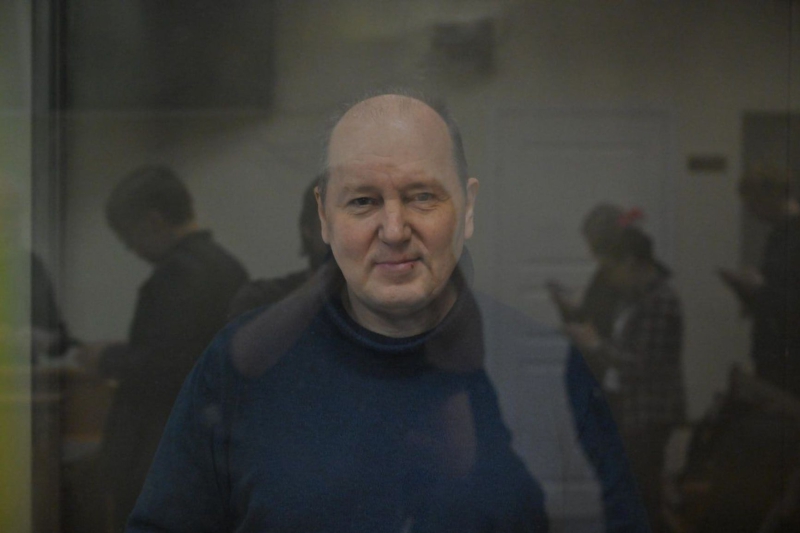
- June 11
The 1st Eastern District Military Court issued a verdict in a case involving charges of incitement to commit a terrorist crime, preparation to incite treason, treason itself, and drug possession. The defendant’s identity and case details remain classified.
Nikolai Lavrentyev, a resident of Zabaykalsky Krai, was sentenced to 11 years in prison for involvement with “Artpodgotovka,” a movement designated a terrorist organization in Russia. Prosecutors alleged he supported the group’s ideology and that he used Telegram to call for the violent overthrow of the government.
The Primorsky Regional Court issued a treason conviction in a case involving an unnamed defendant. No details were disclosed.
The Samara Regional Court sentenced activist and artist Irina Izmaylova to 20 years in prison for treason and producing explosives. Investigators claimed she adhered to a “radical pro-Ukrainian ideology” and manufactured triacetone triperoxide (TATP) on behalf of Ukrainian intelligence to hand over to third parties.
In occupied Kherson, the regional court sentenced 42-year-old Olha Hulchak to 12 years for treason. Prosecutors said that in 2023 she transferred funds to a Ukrainian citizen’s bank account, allegedly to support the Armed Forces of Ukraine.
- June 17
Ukrainian citizen Dmytro Tsyplyakov was sentenced to 20 years by the Southern District Military Court in Rostov-on-Don for plotting to bomb a military command office in Russian-occupied Vasylivka in the Zaporizhzhia Region of Ukraine. According to the court, he joined a terrorist group, contacted Ukrainian intelligence, and was arrested while receiving components for an IED.
The Chelyabinsk Regional Court sentenced 20-year-old Yevgeny Vladytsky to 12 years for “sabotage.” Authorities claimed he set fire to a cellular service base station in Chelyabinsk at the instruction of a “foreign handler” he met via Telegram, causing damage estimated at 252,000 rubles ($3,200).
- June 18
Roman Maryan from Krasnoyarsk was sentenced to nine years for “financing terrorism.” The charge stemmed from a donation made to Vyacheslav Maltsev, founder of the banned terrorist group “Artpodgotovka.” Maryan had previously received a three-year sentence in 2018 related to the same group.
- June 19
Serhii Kucherenko, a native of Sevastopol in Crimea, was sentenced to 17 years for treason, attempted terrorism, and manufacturing explosives. The court claimed he agreed to work with Ukrainian intelligence and was tasked with bombing a military helicopter at an airfield in Sevastopol. He was found with fake explosives, suggesting an FSB sting operation.
Anton Pomykin from Novorossiysk was convicted by the Southern District Military Court for preparing to join a terrorist organization and committing treason. The sentence length and further details were not made public.
Sixty-three-year-old actor Viktor Mosiyenko was sentenced to 17 years for treason, attempted sabotage, involvement in a terrorist group, and possession of explosives. The FSB said he contacted the “Freedom of Russia” legion, retrieved a bomb from a dead drop, and tried to plant it under a railway bridge in Belgorod.
Specifically, Article 356 of the Russian Criminal Code: “Use of Prohibited Means and Methods of Warfare.”
Falun Gong is a spiritual and physical practice founded by Li Hongzhi in China in the early 1990s. Its followers combine meditative exercises with a pursuit of moral and spiritual purification. According to the Falun Dafa Information Center, adherents of the movement face widespread persecution in China, often with lethal consequences. In Russia, seven organizations linked to Falun Gong were declared «undesirable» in the summer of 2020.
The ribbon of Saint George is a Russian military symbol consisting of a black and orange bicolour pattern, with three black and two orange stripes.
Originally created as part of the Russian imperial Order of St. George in 1769, the orange-and-black ribbon was resurrected by the Soviet Union for a medal to celebrate victory over Nazi Germany in World War II. The ribbon’s colors became a fixture of annual May 9 Victory Day celebrations in the Soviet Union and later in Russia, when they began being handed out en masse in 2005. Nearly a decade later, pro-Kremlin activists adopted the ribbon as a symbol during Russia’s 2014 annexation of Crimea and its involvement in the war in Donbas in eastern Ukraine. It has since become widely associated with Russian military aggression.
Ukraine, Moldova, Latvia, Lithuania, and Estonia have all banned the ribbon of St. George from display on their territory after the start of the full-scale invasion of Ukraine in February 2022.
The Eternal Flame is a monument with a continuously burning flame, symbolizing the eternal remembrance of those who died in war, particularly World War II (referred to in Russian historiography as the «Great Patriotic War» when describing the Eastern Front) in the Soviet and post-Soviet tradition.

The “Supreme Court” of the so-called “Luhansk People’s Republic” sentenced a man identified only as “T” to five-and-a-half years in a general-regime colony under Article 275.1 of the Russian Criminal Code — for establishing confidential ties with the Security Service of Ukraine (SBU). In 2021, he allegedly signed an agent questionnaire and began passing information to Ukraine, supposedly “harming the security of the ‘Luhansk People’s Republic’ and Russia.”
- June 20
Vera Sidorkina from Yoshkar-Ola was sentenced to 18 years by the Central District Military Court for treason and attempting to join the “Freedom of Russia” legion, which is classified as a terrorist organization in Russia. Prosecutors said she provided coordinates of military-industrial facilities and attempted to travel to Ukraine with her daughter to join the legion as a medic or support worker.
Nadine Geisler (Nadezhda Rossinskaya), founder of the “Army of Beauties” (“Armiya Krasotok”) movement, was sentenced to 22 years by the 2nd Western District Military Court for abetting terrorist activity and treason, as the investigators claimed that she donated money to the Azov Brigade. Geisler denied authorship of an incriminating post. She was arrested in February 2024, having previously helped Ukrainian refugees and delivered humanitarian aid.
Specifically, Article 356 of the Russian Criminal Code: “Use of Prohibited Means and Methods of Warfare.”
Falun Gong is a spiritual and physical practice founded by Li Hongzhi in China in the early 1990s. Its followers combine meditative exercises with a pursuit of moral and spiritual purification. According to the Falun Dafa Information Center, adherents of the movement face widespread persecution in China, often with lethal consequences. In Russia, seven organizations linked to Falun Gong were declared «undesirable» in the summer of 2020.
The ribbon of Saint George is a Russian military symbol consisting of a black and orange bicolour pattern, with three black and two orange stripes.
Originally created as part of the Russian imperial Order of St. George in 1769, the orange-and-black ribbon was resurrected by the Soviet Union for a medal to celebrate victory over Nazi Germany in World War II. The ribbon’s colors became a fixture of annual May 9 Victory Day celebrations in the Soviet Union and later in Russia, when they began being handed out en masse in 2005. Nearly a decade later, pro-Kremlin activists adopted the ribbon as a symbol during Russia’s 2014 annexation of Crimea and its involvement in the war in Donbas in eastern Ukraine. It has since become widely associated with Russian military aggression.
Ukraine, Moldova, Latvia, Lithuania, and Estonia have all banned the ribbon of St. George from display on their territory after the start of the full-scale invasion of Ukraine in February 2022.
The Eternal Flame is a monument with a continuously burning flame, symbolizing the eternal remembrance of those who died in war, particularly World War II (referred to in Russian historiography as the «Great Patriotic War» when describing the Eastern Front) in the Soviet and post-Soviet tradition.
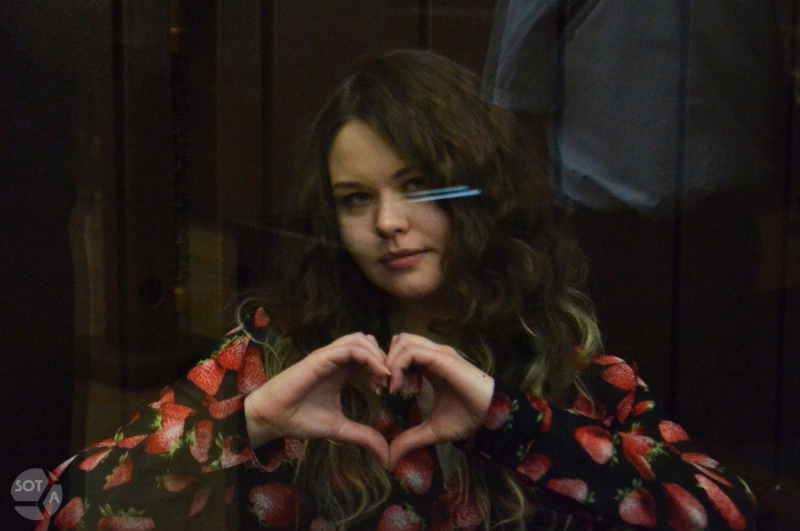
- June 23
The Southern District Military Court in Rostov-on-Don sentenced Volodymyr Bodnar, a native of Zaporizhzhia, to 13 years for planning a terrorist attack and illegal possession of explosives. Authorities claimed he transported a homemade bomb and gathered intel on the movements of Crimea’s occupation administrator, Sergey Aksyonov, with the intent to carry out an assassination. The plan failed, as the bomb was found and neutralized.
- June 24
The Kursk Regional Court sentenced Alexander Abramov from the Glushkovsky District to 24 years for treason in the form of espionage, possession of explosives, and attempted murder of a law enforcement official. He was accused of transmitting information about Russian troop movements near the border to Ukrainian intelligence. Upon arrest, he allegedly tried to detonate a grenade.
A military court in Yekaterinburg sentenced Russian military officer Yevgeny Alakayev to 18 years for treason and disclosing state secrets. Investigators claimed he sent photos of a classified document detailing Russian peacekeeper deaths in Nagorno-Karabakh to his mother and to an Orthodox priest. He was also accused of passing secret data to the Ukrainian Greek Catholic Church. Alakayev denied all charges. The trial was held behind closed doors.
- June 25
Ukrainian citizen Yulian Belokon was sentenced to 12 years for espionage by the “Supreme Court” of the self-proclaimed “Donetsk “People’s Republic.” Prosecutors claimed that he shared information about the location of Russian troops in Donetsk with Ukrainian intelligence in October 2023.
Turan Ustyugov, a 19-year-old citizen of Kazakhstan, was sentenced to 12 years by the Southern District Military Court for intending to join the Russian Volunteer Corps, the Freedom of Russia legion, or the Azov Brigade, all of which are designated in Russia as terrorist groups. He was convicted of participating in a terrorist organization and receiving terrorist training. Ustyugov was arrested in Crimea in October 2024 while allegedly trying to enter Ukraine through the occupied peninsula.
The Russia-installed occupation court in Kherson sentenced Ukrainian citizen Yevhen Horyn to 23 years for sabotage in the Black Sea. He was accused of undergoing foreign training, blowing up a gas platform — rendering it inoperable — and damaging a navigation infrastructure facility. Gorin was also convicted of making an illegal border crossing, smuggling, and transporting weapons and explosives.
Specifically, Article 356 of the Russian Criminal Code: “Use of Prohibited Means and Methods of Warfare.”
Falun Gong is a spiritual and physical practice founded by Li Hongzhi in China in the early 1990s. Its followers combine meditative exercises with a pursuit of moral and spiritual purification. According to the Falun Dafa Information Center, adherents of the movement face widespread persecution in China, often with lethal consequences. In Russia, seven organizations linked to Falun Gong were declared «undesirable» in the summer of 2020.
The ribbon of Saint George is a Russian military symbol consisting of a black and orange bicolour pattern, with three black and two orange stripes.
Originally created as part of the Russian imperial Order of St. George in 1769, the orange-and-black ribbon was resurrected by the Soviet Union for a medal to celebrate victory over Nazi Germany in World War II. The ribbon’s colors became a fixture of annual May 9 Victory Day celebrations in the Soviet Union and later in Russia, when they began being handed out en masse in 2005. Nearly a decade later, pro-Kremlin activists adopted the ribbon as a symbol during Russia’s 2014 annexation of Crimea and its involvement in the war in Donbas in eastern Ukraine. It has since become widely associated with Russian military aggression.
Ukraine, Moldova, Latvia, Lithuania, and Estonia have all banned the ribbon of St. George from display on their territory after the start of the full-scale invasion of Ukraine in February 2022.
The Eternal Flame is a monument with a continuously burning flame, symbolizing the eternal remembrance of those who died in war, particularly World War II (referred to in Russian historiography as the «Great Patriotic War» when describing the Eastern Front) in the Soviet and post-Soviet tradition.
The “Supreme Court” of the so-called “Luhansk People’s Republic” sentenced 21-year-old Vladyslav Rohachov to 17 years for treason. Prosecutors claimed that after viewing anti-war content online in July 2023, Rogachov became personally opposed to Russia’s invasion, developed a “rejection of the goals of the ‘special military operation’” and began cooperating with Ukraine. He allegedly shared military location data via voice messages; investigators said this information could have been used to target Russian troops.
- June 26
Mikhail Komkov was sentenced to 14 years by the Southern District Military Court for treason and justifying terrorism. The court said Komkov posted a comment online in support of the Russian Volunteer Corps and later contacted Ukrainian intelligence, to whom he allegedly transmitted military unit locations, FSB border service ship data, and information about Black Sea Fleet equipment in Novorossiysk.
Twenty-nine-year-old Alexei Romanyuk, a graduate of the Kaliningrad branch of the Russian Naval Academy, was convicted by the Southern District Military Court on charges of treason, participating in a terrorist group, planning a terrorist attack, possession of explosives, and smuggling. The trial was closed to the public, and his sentence was not disclosed. At the time of his arrest, Romanyuk was living in Novorossiysk, a port city on the Black Sea in southern Russia.
Specifically, Article 356 of the Russian Criminal Code: “Use of Prohibited Means and Methods of Warfare.”
Falun Gong is a spiritual and physical practice founded by Li Hongzhi in China in the early 1990s. Its followers combine meditative exercises with a pursuit of moral and spiritual purification. According to the Falun Dafa Information Center, adherents of the movement face widespread persecution in China, often with lethal consequences. In Russia, seven organizations linked to Falun Gong were declared «undesirable» in the summer of 2020.
The ribbon of Saint George is a Russian military symbol consisting of a black and orange bicolour pattern, with three black and two orange stripes.
Originally created as part of the Russian imperial Order of St. George in 1769, the orange-and-black ribbon was resurrected by the Soviet Union for a medal to celebrate victory over Nazi Germany in World War II. The ribbon’s colors became a fixture of annual May 9 Victory Day celebrations in the Soviet Union and later in Russia, when they began being handed out en masse in 2005. Nearly a decade later, pro-Kremlin activists adopted the ribbon as a symbol during Russia’s 2014 annexation of Crimea and its involvement in the war in Donbas in eastern Ukraine. It has since become widely associated with Russian military aggression.
Ukraine, Moldova, Latvia, Lithuania, and Estonia have all banned the ribbon of St. George from display on their territory after the start of the full-scale invasion of Ukraine in February 2022.
The Eternal Flame is a monument with a continuously burning flame, symbolizing the eternal remembrance of those who died in war, particularly World War II (referred to in Russian historiography as the «Great Patriotic War» when describing the Eastern Front) in the Soviet and post-Soviet tradition.
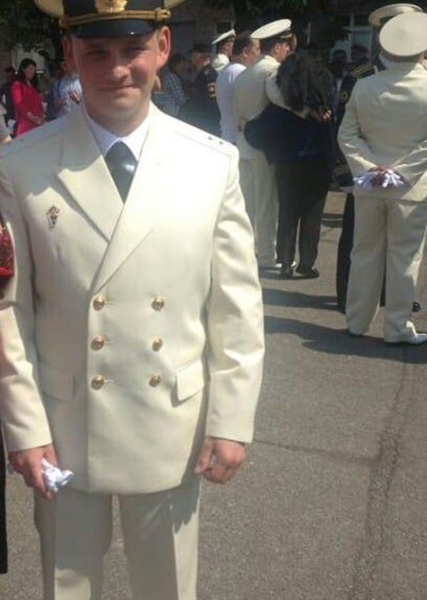
The 2nd Western District Military Court concluded a criminal case in a single session, convicting an unnamed defendant on charges of treason, participation in a terrorist organization, and committing a terrorist act as part of a group. The defendant’s identity and sentence were not disclosed.
The 1st Eastern District Military Court issued a verdict in another closed case, involving charges of confidential cooperation with a foreign state, public incitement to terrorism, desecration of corpses based on hatred, and membership in a terrorist organization. Neither the defendant’s name nor sentence was made public.
Grigory Skvortsov, a photographer, was sentenced to 16 years for treason by the Perm Regional Court. The case centered on his transfer of declassified documents about Soviet fortifications — purchased from open sources — to an American journalist. Skvortsov, who had publicly opposed the war in 2022 in an interview with the German publication Sonic Seducer, denied all charges.
In occupied Kherson, Dmytro Samchuk (Dmitry Samchuk) received 13 years for treason. The court said he voluntarily passed information to Ukrainian intelligence about Russian troop locations in the Kalanchak District in March 2024.
- June 27
Oleksandr Hazda (30) and Andriy Matienko (35), both from Kherson, were sentenced to 20 and 11 years respectively by the Southern District Military Court. Prosecutors alleged they trained with Ukrainian intelligence, transported explosives from Ukraine, and plotted to assassinate a collaborator in Kherson. They were arrested in September 2022 before the attack could be carried out.
Gennady Artyomenko, a 57-year-old military pensioner from Dzerzhinsk, received 18 years for treason, incitement to terrorism, and possession of explosives. Authorities claimed he supported the Ukrainian movement “Atesh,” photographed an FSB building, and distributed anti-war leaflets. His attorney called the case politically driven, citing Artyomenko’s Ukrainian heritage and his efforts to evacuate his mother from a war zone.
Svitlana Kovalyova, 56, a Ukrainian citizen, was sentenced to 15 years by the Supreme Court of the so-called “Luhansk People’s Republic” for espionage. She was accused of transmitting information about Russian troops in occupied Luhansk in May 2023.
Trials of Ukrainian POWs in Kursk and beyond
In Kursk, the 2nd Western District Military Court sentenced 49 Ukrainian POWs across 28 trials over the course of June. All were found guilty of committing terrorist acts on Russian territory and received sentences ranging from 14 to 17 years.
Notably, June saw the first conviction of a female POW in Kursk since The Insider began monitoring such cases four months ago.
Nataliia Balaklytska, a soldier from Ukraine’s 116th Territorial Defense Brigade, was sentenced to 15 years in prison on June 19. Prosecutors accused her of seizing civilian homes at gunpoint, obstructing evacuations, firing on Russian troops and civilians, and helping blockade the villages of Sudzha and Olgovka in Kursk. Despite the severity of the accusations against her, Balaklitskaya was not charged under laws on conduct of war.
Specifically, Article 356 of the Russian Criminal Code: “Use of Prohibited Means and Methods of Warfare.”
Falun Gong is a spiritual and physical practice founded by Li Hongzhi in China in the early 1990s. Its followers combine meditative exercises with a pursuit of moral and spiritual purification. According to the Falun Dafa Information Center, adherents of the movement face widespread persecution in China, often with lethal consequences. In Russia, seven organizations linked to Falun Gong were declared «undesirable» in the summer of 2020.
The ribbon of Saint George is a Russian military symbol consisting of a black and orange bicolour pattern, with three black and two orange stripes.
Originally created as part of the Russian imperial Order of St. George in 1769, the orange-and-black ribbon was resurrected by the Soviet Union for a medal to celebrate victory over Nazi Germany in World War II. The ribbon’s colors became a fixture of annual May 9 Victory Day celebrations in the Soviet Union and later in Russia, when they began being handed out en masse in 2005. Nearly a decade later, pro-Kremlin activists adopted the ribbon as a symbol during Russia’s 2014 annexation of Crimea and its involvement in the war in Donbas in eastern Ukraine. It has since become widely associated with Russian military aggression.
Ukraine, Moldova, Latvia, Lithuania, and Estonia have all banned the ribbon of St. George from display on their territory after the start of the full-scale invasion of Ukraine in February 2022.
The Eternal Flame is a monument with a continuously burning flame, symbolizing the eternal remembrance of those who died in war, particularly World War II (referred to in Russian historiography as the «Great Patriotic War» when describing the Eastern Front) in the Soviet and post-Soviet tradition.
The following is a list of Ukrainian POWs sentenced in June 2025 for the Kursk border incursion:
- Volodymyr Nikolenko
- Valerii Meshcherskyi
- Dmytro Muntian
- Oleksandr Tsvyliy
- Oleksandr Kozhemiaka
- Oleh Shved
- Serhii Stokoz
- Vadym Rozhkov
- Ihor Drebeda
- Volodymyr Holodniak
- Yevhen Kopaigora
- Volodymyr Samorodchenko
- Ivan Sova
- Ivan Holynskyi
- Pablo Puentes Borges
- Vasyl Nahornyi
- Oleksandr Rafaliuk
- Mykola Horpynchenko
- Anatolii Chepel
- Volodymyr Yatskovskyi
- Vasyl Mashyko
- Stepan Rustamov
- Serhii Voitsekhovskyi
- Maksym Yemelianov
- Vitalii Nazarenko
- Kostiantyn Cherkashyn
Serhii Bevz - Andrii Shevchenko
- Serhii Borysov
- Oleksandr Titenko
- Vasyl Kataniuk
- Oleksandr Dudnyk
- Nataliia Balaklytska
- Yevhen Kraivanov
- Oleksandr Petukhov
- Roman Yermachenko
- Yevhen Vasyliev
- Yevhen Hocha
- Ihor Snyzhko
- Oleksandr Zahrebelnyi
- Oleksandr Hryhoriev
- Andrii Bakalov
- Oleksandr Petrechenko
- Viacheslav Hrabin
- Serhii Rukavytsia
- Mykola Taratuta
- Volodymyr Zakharychev
- Oleksandr Koroliev
- Anton Petsera
Outside of Kursk, nine publicly known verdicts were handed down to Ukrainian prisoners of war in May.
On June 3, the Southern District Military Court in Rostov-on-Don sentenced Ukrainian POW Oleksandr Sabadash, a soldier with the 12th Azov Special Forces Brigade of Ukraine’s National Guard, on charges of participating in a terrorist organization and undergoing terrorist training. According to the Wartears database, Sabadash was born in 1984 and was captured before May 2023.
On June 4, a Russian court sentenced Azov Brigade soldier Danylo Ovcharenko to 23.5 years in a maximum-security colony for the alleged murder of a civilian in Mariupol. Prosecutors claimed that in March-April 2022, he shot a man with a Stechkin pistol. Ovcharenko was found guilty of cruel treatment of civilians during armed conflict and murder motivated by ideological and political hatred.
On June 9, Azov sniper Ruslan Orlov and medic Artem Novykov were sentenced to 26 and 24 years in prison, respectively. Investigators claimed that in April 2022 in Mariupol, under orders from their command, they executed three men allegedly supportive of pro-Russian positions. Both were convicted of cruel treatment of civilians and murder motivated by political and ideological hatred.
On June 10, the Southern District Military Court sentenced Ukrainian POW Oleksandr Kolyuda to 18 years in prison for participating in a terrorist organization and undergoing terrorist training. Prosecutors claimed that he served as an instructor at Azov’s sergeant school. Kolyuda was captured after the surrender at Azovstal in May 2022.
On June 16, the same court sentenced 23-year-old private Arkadii Lyubchenko to 13 years for joining a terrorist organization. Investigators claimed that in 2023, he trained with the Armed Forces of Ukraine, voluntarily joined a nationalist battalion. He is alleged to have fought near Kostyantynivka and to have opened fire on Russian soldiers during his capture.
On June 17, the same court sentenced Azov Brigade fighter Artem Chesnokov, previously a member of the Ukrainian Right Sector, on charges of participating in a terrorist organization and receiving terrorist training. Chesnokov was taken prisoner after the defense of Azovstal in Mariupol.
That same day, the “Supreme Court” of the so-called “Donetsk People’s Republic” sentenced former Azov Brigade fighters Ivan Nozhechkyn and Yehor Yakovenko to 25 and 26 years in prison, respectively. They were found guilty of shelling residential homes in the village of Agrobaza near Mariupol in March 2022.
On June 26, the Southern District Military Court sentenced Andriy Rybak to 13 years for participating in the activities of the Aidar battalion, which is designated a terrorist organization in Russia. Prosecutors alleged that Rybak voluntarily joined the battalion in July 2024 and participated in combat operations in Ukraine’s Donetsk Region.
That same day, the court sentenced 60-year-old Ukrainian citizen Serhii Kut'ko for his involvement with Aidar. According to the investigators, he voluntarily joined the battalion in 2017 and participated in combat as a grenadier in the Donetsk Region. The court found Kut’ko guilty of participating in a terrorist organization; the length of his sentence was not disclosed.
Attorney Valeria Vetoshkina, in comments to The Insider, stated that Russia’s judicial system — especially when it comes to cases related to the war in Ukraine — does not meet the standards of independence and impartiality, making it impossible to establish facts objectively:
“Appointed lawyers often go through the motions; case materials are often classified, and trials are held behind closed doors; confessions may be extracted under pressure or torture; and prosecution witnesses are never verified for credibility…Russian investigators exploit a system of complete impunity and lack of independent oversight. They can fabricate cases from scratch — especially against symbolic figures like Azov [Brigade] fighters; they can pin unsolved civilian murders on prisoners without any witnesses or evidence; and they can use these cases for propaganda, to create an illusion of righteous retribution.”
In June, 21 verdicts were issued in which 28 people received prison terms for online comments, protest participation, links to “extremist” or “undesirable” organizations, and acts labeled by Russian authorities as constituting the glorification of Nazism or desecration of military symbols. Below are the most illustrative cases in this category.
On June 2, the Stavropol Regional Court sentenced four residents of the village of Grushevskoye to between one and one-and-a-half years in a penal colony for glorifying Nazism. According to investigators, Shurman Ivanov, Roman Stepanenko, Sergey Stepanenko, and an unnamed young man danced the Lezginka — a traditional Caucasian folk dance — near a mass grave of Soviet WWII resistance fighters and the Eternal Flame, and ate sunflower seeds near the monument, discarding husks on the granite. One of the defendants received one year in prison, while the other three were handed 1.5 years each.
On June 5, the Russia-installed occupation Zaporizhzhia Regional Court sentenced a woman from Melitopol to seven years in prison for destroying an orange-and-black Saint George’s ribbon and posting photo and video evidence of the act on Telegram. Prosecutors claimed that in April 2023, she was instructed by an unknown “Ivan” to film herself destroying the ribbon and to send him the footage. Her underage daughter appeared in the video. The mother was convicted of desecrating military symbols, involving a minor in criminal activity, and insulting state symbols.
On June 9, the Supreme Court of Bashkortostan sentenced two 21-year-old residents of Neftekamsk — reportedly Amir Amirov and Almaz Mukhamatdinov — to two years of corrective labor for “desecrating military symbols” (Article 354.1, Part 4 of Russia’s Criminal Code). The charges stemmed from an incident in which the men allegedly urinated on a BTR armored vehicle that was displayed on a pedestal as part of a memorial. A criminal case under the same article was opened against the 17-year-old girl who uploaded the video of the incident online.
On June 18, the Southern District Military Court sentenced Georgian citizen Irakli Khufenia to 2 years in a general-regime colony for “publicly justifying terrorism.” The charges related to two social media posts that were made while he was in Georgia, one featuring a photo of a fallen Georgian Legion fighter with a Georgian-language caption, and another showing a road sign with Ukrainian symbols reading “Welcome to the Kursk Region.” Khufenia was arrested at the Verkhny Lars checkpoint after crossing into Russia in January 2025.
On June 23, artist Svetlana Agibalova and her partner Vladislav Remnev were sentenced to 3.5 years in a general-regime colony for vandalism and threatening journalists. Investigators alleged that in fall 2023, they painted boar-shaped pentagrams on the doors of five Russian state media figures covering the war, including VGTRK correspondent Andrei Medvedev and Komsomolskaya Pravda’s Dmitry Steshin. The act was allegedly commissioned via Telegram. In court, Agibalova claimed she believed the work was Halloween-themed and that she was paid 5,000 rubles ($64) per door. The pair admitted to participating in the action but said they did not understand its political nature.
That same day, the Cherkessk City Court sentenced 45-year-old Vladimir Fomin, a legally disabled man, to 4.5 years in prison. The charges were based on Bible discussions he held with a local woman — who, it later emerged, was working with the FSB and was secretly recording him. Fomin was convicted of participating in the Jehovah’s Witnesses — a religious organization banned in Russia — and of recruiting others into it.
On June 25, the Preobrazhensky District Court in Moscow sentenced programmer Ilya Vasiliev — also known as Arvi Hacker, founder of the “Civic School of Hackers” and abbot of a Zen Buddhist center — to eight years in a general-regime colony for a Facebook post written about Christmas in 2022. The post, in English, commented on a painting by a Ukrainian artist and mentioned civilian deaths in Kherson. According to a source who provided information to The Insider, the courtroom was packed at the sentencing — white-hat hackers, Zen Buddhists in kasayas, and dozens of supporters came to show solidarity. Vasiliev’s 79-year-old mother, speaking after the verdict, recalled how her grandfather had been executed for careless words under Stalin. Defense attorney Gevorg Aleksanyan called the sentence “horrific even by today’s standards,” noting that the case file included official Russian statements acknowledging the shelling of Kherson. Vasiliev denied all charges.
Specifically, Article 356 of the Russian Criminal Code: “Use of Prohibited Means and Methods of Warfare.”
Falun Gong is a spiritual and physical practice founded by Li Hongzhi in China in the early 1990s. Its followers combine meditative exercises with a pursuit of moral and spiritual purification. According to the Falun Dafa Information Center, adherents of the movement face widespread persecution in China, often with lethal consequences. In Russia, seven organizations linked to Falun Gong were declared «undesirable» in the summer of 2020.
The ribbon of Saint George is a Russian military symbol consisting of a black and orange bicolour pattern, with three black and two orange stripes.
Originally created as part of the Russian imperial Order of St. George in 1769, the orange-and-black ribbon was resurrected by the Soviet Union for a medal to celebrate victory over Nazi Germany in World War II. The ribbon’s colors became a fixture of annual May 9 Victory Day celebrations in the Soviet Union and later in Russia, when they began being handed out en masse in 2005. Nearly a decade later, pro-Kremlin activists adopted the ribbon as a symbol during Russia’s 2014 annexation of Crimea and its involvement in the war in Donbas in eastern Ukraine. It has since become widely associated with Russian military aggression.
Ukraine, Moldova, Latvia, Lithuania, and Estonia have all banned the ribbon of St. George from display on their territory after the start of the full-scale invasion of Ukraine in February 2022.
The Eternal Flame is a monument with a continuously burning flame, symbolizing the eternal remembrance of those who died in war, particularly World War II (referred to in Russian historiography as the «Great Patriotic War» when describing the Eastern Front) in the Soviet and post-Soviet tradition.
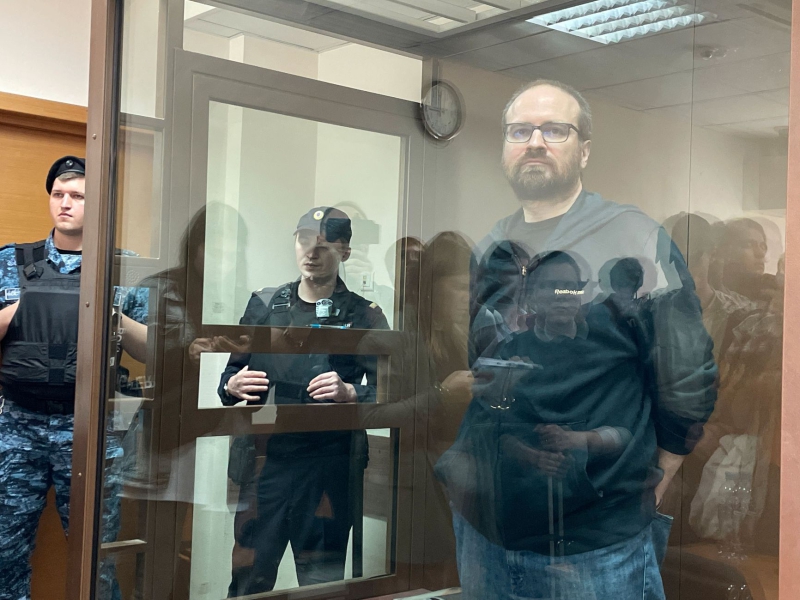
On June 27, the Sovetsky District Court in Tomsk sentenced Zhu Yun to three years in a general-regime penal colony on charges of organizing the activities of an “undesirable organization.” According to investigators, from September 2021 to November 2023, he held meetings for followers of the Falun Gong movement, rented venues, and collected funds for the distribution of informational materials.
On June 30, Moscow’s Tverskoy District Court ordered Yevgeny Kikeev, a defendant in the so-called “Moscow Case” (“Moskovskoye Delo”) to undergo compulsory psychiatric treatment. He was charged with inciting hatred via threats of violence and calling for mass unrest. The statements in question were made at a rally on Aug. 31, 2019, where Kikeev criticized the peaceful nature of political protests in Moscow and called for Russians to “fight like in Ukraine.”
Other individuals sentenced in June include:
This list of verdicts is not exhaustive, as it only reflects information available in the public domain. Russia’s courts and the press offices of law enforcement agencies do not report all rulings, and journalists attend only a limited number of hearings. In some cases, the exact sentencing date could not be established — in these instances, the date of the first publication is used. The roundup does not include trials in absentia; only cases where individuals were actually deprived of their liberty are included.
Specifically, Article 356 of the Russian Criminal Code: “Use of Prohibited Means and Methods of Warfare.”
Falun Gong is a spiritual and physical practice founded by Li Hongzhi in China in the early 1990s. Its followers combine meditative exercises with a pursuit of moral and spiritual purification. According to the Falun Dafa Information Center, adherents of the movement face widespread persecution in China, often with lethal consequences. In Russia, seven organizations linked to Falun Gong were declared «undesirable» in the summer of 2020.
The ribbon of Saint George is a Russian military symbol consisting of a black and orange bicolour pattern, with three black and two orange stripes.
Originally created as part of the Russian imperial Order of St. George in 1769, the orange-and-black ribbon was resurrected by the Soviet Union for a medal to celebrate victory over Nazi Germany in World War II. The ribbon’s colors became a fixture of annual May 9 Victory Day celebrations in the Soviet Union and later in Russia, when they began being handed out en masse in 2005. Nearly a decade later, pro-Kremlin activists adopted the ribbon as a symbol during Russia’s 2014 annexation of Crimea and its involvement in the war in Donbas in eastern Ukraine. It has since become widely associated with Russian military aggression.
Ukraine, Moldova, Latvia, Lithuania, and Estonia have all banned the ribbon of St. George from display on their territory after the start of the full-scale invasion of Ukraine in February 2022.
The Eternal Flame is a monument with a continuously burning flame, symbolizing the eternal remembrance of those who died in war, particularly World War II (referred to in Russian historiography as the «Great Patriotic War» when describing the Eastern Front) in the Soviet and post-Soviet tradition.

